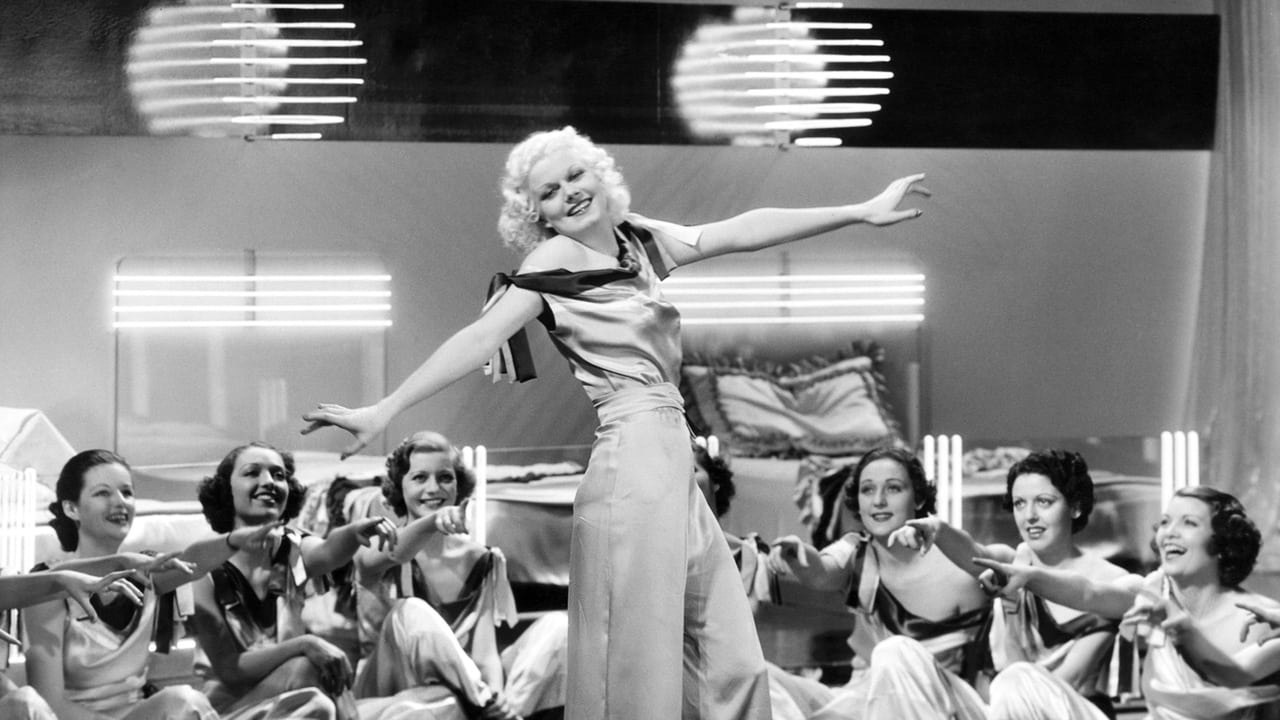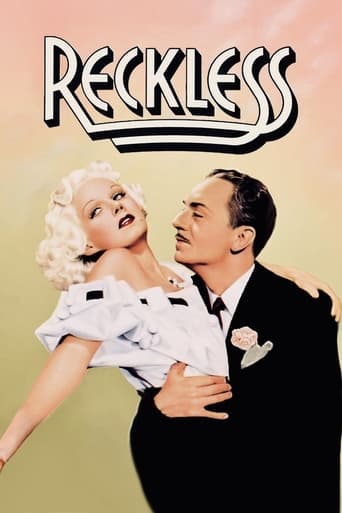

RECKLESS (Metro-Goldwyn-Mayer, 1935), directed by Victor Fleming, is an odd little title for a movie classified as a musical for that there's no reckless driving involved nor reckless living to classify its story. It is, however, a title tune for a production number delivered by the studio's platinum blonde bombshell, Jean Harlow (1911-1937). For Harlow starring in a backstage story where she gets to "sing" and dance, one would expect a sort of "gold digger" theme involving three sassy Broadway show girls (possibly Harlow, Una Merkel and Patsy Kelly) out to nab some rich husbands. Instead, RECKLESS is very much Harlow's as the center of attention for a scripted story by Oliver Jeffries supposedly based loosely on the life and incidents of an actual entertainer named Lilly Holman.Set on Broadway in the Great White Way, Ned Riley (William Powell), is introduced as a sports promoter staying at the 43rd Street Hotel with his assistants, Blossom (Nat Pendleton) and Smiley (Ted Healy). His sleep is interrupted by the arrival of Granny (May Robson) coming to Ned to have him raise bail for her granddaughter, stage star Mona Leslie (Jean Harlow), who's being held on a reckless driving charge at the House of Detention for Women. Ned, being Mona's agent and discoverer, arranges her release in time for the upcoming charity benefit, only to discover the stage show arranged by millionaire playboy, Bob Morrison Jr. (Franchot Tone), who has bought every seat in the theater so he could be the only one to watch Mona perform. Later, Mona becomes romantically involved with Bob. They eventually elope, much to the chagrin of Bob's father (Henry Stephenson), having high hopes for his son marrying Josephine Mercer (Rosalind Russell), his childhood sweetheart. Though Josephine comes to like Mona, the rest of Bob's family and friends prove otherwise, making her feel like an outsider. After Josephine marries Ralph Watson (Leon Ames, billed as Leon Waycoff), Bob realizes the error in his ways, leading to tragedy involving Mona's custody battle over her baby and attempt of a theatrical comeback to a very unruly audience.In the listing of players credited (in order of appearance rather than the standard billing), there's Mickey Rooney as Eddie, a little boy briefly seen in two scenes with William Powell; Robert Light (Paul Mercer, Josephine's brother); James Ellison (Dale Eberly); Charles Middleton, Harold Huber and Charles C. Wilson. There's also famous wrestlers of the day, Man Mountain Dean, Hans Steinke and Ernie Hayes, appearing as themselves. Look quickly for Allan Jones (singer) and Margaret Dumont (woman in audience), best known for their major supporting performances opposite the Marx Brothers in A NIGHT AT THE OPERA (MGM, 1935) each taking time away from that comedy classic in cameo appearances. Songs featured in this production include: "Reckless" (by Jerome Kern and Oscar Hammerstein/ Ensemble: Jean Harlow, Allan Jones, Carl Randall and Nina Mae McKinney); "Everything's Been Done Before" (sung by Allan Jones); "Cyclone" (dance number); "Here's What My Heart is Saying" and "Reckless." Though Harlow sings, her vocalization is obviously dubbed with choreography lavish scale but forgettable. Interestingly, the "Reckless" number was selected in part of its musical segment profiled for the documentary on MGM musicals titled THAT'S ENTERTAINMENT (1974).The problem about RECKLESS, clocked at 97 minutes and produced by David O. Selznick, is that it could have been a really fine musical, even better. Rather than presenting a full comedy with standard singing and dancing, the plot generally looks more like a setback to those melodramatic overtones found in those early talkie MGM musicals (1929-30). RECKLESS does have its share of amusements and wisecracks commonly found in thirties movies, however, with William Powell doing his share with Harlow and the rest of the cast. Powell and Harlow had much better luck in the hilarious comedy, LIBELED LADY (1936), but it's only during the latter portion of RECKLESS does the story weaken to conclusion that doesn't ring true. Harlow and Franchot Tone have worked amusingly well together in both BOMBSHELL (1933) and THE GIRL FROM MISSOURI (1934), but with RECKLESS having their serious moments together, especially during Tone's drunken tantrums, they are either satisfactory or a bit unpleasant. Rosalind Russell is a refreshing presence here while the rest of the cast tries hard to rise above this so-so script.Considering mixed reactions then and now, RECKLESS wouldn't be classified as Hollywood's greatest musicals. It's somewhat all-star cast and MGM gloss does save it from being lost and forgotten to classic film historians, especially over the years with its presentations in revival movie houses in New York City as Museum of Modern Art (1980 to a full house) or the Regency Theater in the seventies and eighties, followed by availability on video cassette (1995), DVD and broadcasts on cable television's Turner Classic Movies since 1994. (**)
... View MoreEven with big stars and an expensive production with songs by Jerome Kern and Oscar Hammerstein this is a minor film reworking of the Libby Holman tragedy. Powell is fine but in the background as is Rosalind in an early film where she is still in her grand lady phase. Ever the trouper Jean does what she can in a part for which she is hopelessly ill suited. She was aware of her limitations as much as anyone but went ahead with this even after expressing her doubts because it provided an opportunity for her to work with Bill Powell with whom she was personally involved. She does fine in the dramatic portions and is snappy at the beginning but she was no singer and is obviously dubbed. As a dancer well...she was a fine comedienne.
... View MoreApparently when this debuted it was a box office dud. And, apparently Jean Harlow was offended because she thought the studio deliberately put parallels into the script that mirrored her tragic marriage to a man who died under suspicious circumstances (even today, no one seems exactly sure what happened to her husband, Paul Bern). What is obvious is that Harlow should have been offended as the script clearly takes advantage of Bern's death. Now if the film had come out shortly after this tragedy, perhaps the studio could have been excused as they might have been able to claim that they made such a film to help Harlow's image (after all, like the character in the film, the public COULD have blamed Harlow for his death). But, with a three year gap between them, it's obvious they were just trying to exploit the tragedy for ticket sales--and I am surprised that apparently William Powell was able to convince Harlow to play this part. Frankly, based on the end results, I think she should have faced suspension and refused! Now this isn't because all the film is bad--but the ending is just god-awful and makes the entire film come off as rather seedy and stupid.It's important to note that after the film was completed, a total idiot at the studio thought they should add some song and dance numbers--even though Harlow was incapable of doing either--especially sing. Since she couldn't sing, they dubbed another's voice and the end result is, without a doubt, the WORST job of dubbing in the history of Hollywood. At first, I really did think that they deliberately did it badly as a parody--but later, at the end, is a supposedly poignant moment and once again, her lips aren't even close to being in sync and the voice is so obviously another's. Heck, had they used Paul Robson's voice, I don't it would have come off much worse!! As far as the story goes, the first 90% of the film (aside from the singing and dancing) isn't bad even if it is taking full advantage of the Bern tragedy (as well as the death Libby Holman's husband--which is even closer to the plot of this film than the Harlow/Bern death). Harlow plays an actress who is very much like herself. When she meets a rich society guy (Franchot Tone), they fall in love and soon marry--much to the consternation of her agent (William Powell--who really was in love with Harlow in real life). However, things are not rosy, as Tone's father and many society folk don't accept a common actress. But, Harlow handles it very well and soon the society swells warm up to her. However, Tone is a complete loser and spends all his time drinking and moping--and regretting marrying Harlow. Instead, he thinks back to his old fiancée (Rosalind Russell) and wishes he'd married her. Russell is classy and from an old established family--and Tone seems much more concerned about this than whether or not his wife loves or respects him. Eventually, Tone becomes so depressed that he kills himself (just like Holman and Harlow's husbands). And, the rich society swells turn on Harlow even though she is practically angelic in how she handles this. All this leads to her returning to the stage and a completely horrible ending that simply made me cringe.The bottom line is that the actors try their best but the script is horrid (in spots) and the singing is cringe-worthy. It's sad, as without the terrible ending and singing, I would have given this one a 7. As it is, 4 is probably a bit charitable. Worth seeing because it's so awful and exploitative but not a good film by any standard.
... View MoreAlthough Jean Harlow disliked playing this part in Reckless because she was a friend of Libby Holman on whom her part is based, she did it anyway, because it was a great part and she turned in a great performance. It was also her first of two films with William Powell whom she was going to marry at the time she died.No doubt the notoriety of the Zachary Smith Reynolds suicide which was in the presence of Ms. Holman, well known torch singer from the twenties was a wonderful story. Can you see the wheels turning in Louis B. Mayer's mind? Star Jean Harlow in this film, also because of her own suicide scandal involving her late husband, Paul Bern. This can't miss at the box office and it didn't. Of course if the film were made today, it would also include Libby Holman's lesbian affairs. As the Code was now in place, that was an aspect that MGM couldn't film in Reckless. Although Harlow is clearly in the lead, Franchot Tone also got one of his best roles as the young millionaire from the horsey set who's not wrapped too tight although that's not apparent at first. For once his part from MGM did not include just wearing tails and being charming.Of the leads William Powell is clearly in third place, he just has to be dapper and supportive as the family lawyer for Harlow and grandmother May Robson. He gets to do a great drunk act though. Speaking of Robson her part in Reckless probably led to her being cast as Janet Gaynor's grandmother in A Star Is Born.This was an early film for Rosalind Russell who plays the girl Tone jilts when he marries Harlow. She plays it nice and supportive. Russell did China Seas as well with Harlow and in her memoirs, she says that Harlow was a kind, generous, and supportive to a new kid on the lot. Who could know she would be dead within two years.Reckless is one of Jean Harlow's best acted parts in her career. Fans of her and Franchot Tone should not miss this film by any means.
... View More